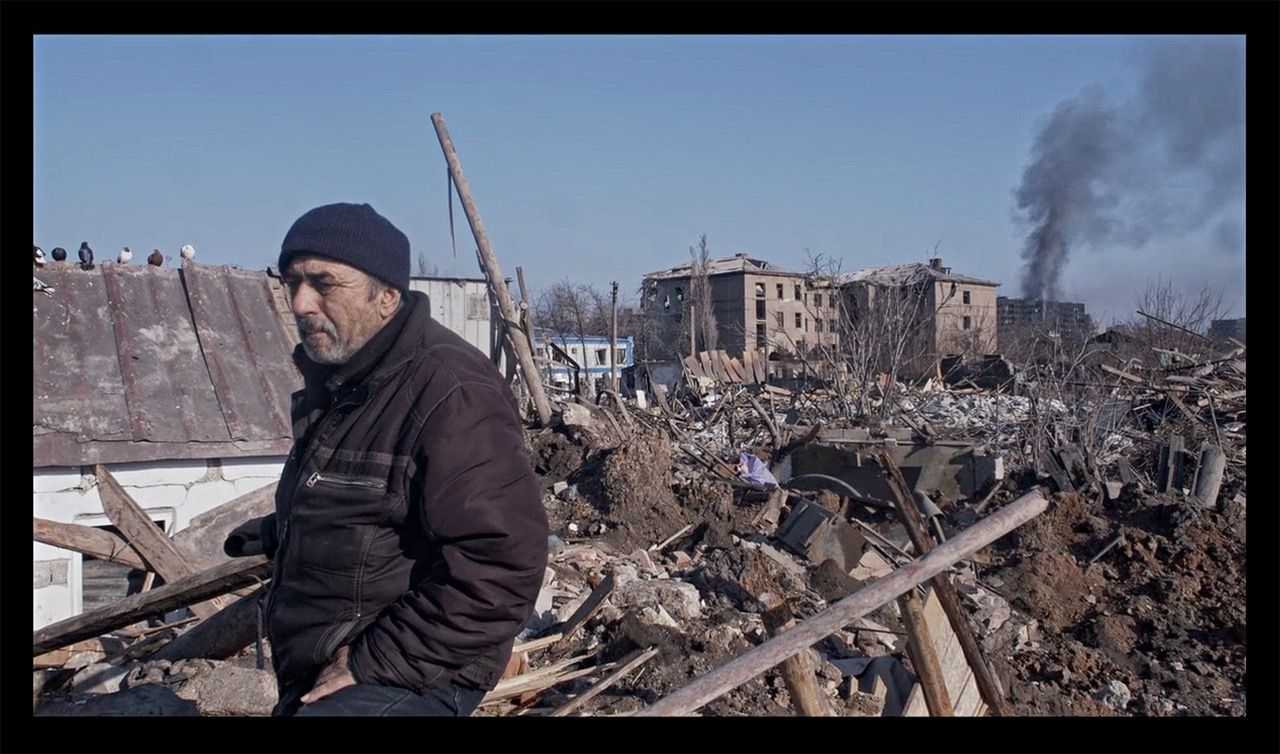Mariupolis 2
Mariupolis 2
VERDICT: Lithuanian filmmaker Mantas Kvedaravi?ius was killed by Russian soldiers after shooting footage for this gritty and unnerving documentary about life in the besieged, bombed-out Ukrainian city of Mariupol.
Mariupol is now more than just a physical, geographical entity. Proclaimed a “Hero City” by Ukrainian president Volodymyr Zelenskyy, it exists in the public consciousness as the ultimate symbol of Ukrainian resistance against Russian aggression. But Mariupol – founded in 1778, and home to 431,000 as of last year – is also something there, on the ground, inhabited by real people. Bar the footage circulating on news bulletins and social media, not much has been said about the tortuous and perilous existence of the civilians who braved an 86-day siege with nearly nothing to fall back on.
That’s where Mantas Kvedaravi?ius came in – again. An anthropologist by training, the Lithuanian filmmaker had already made one documentary about the city, based on the footage he shot during his first visit there in the spring of 2015. With people still visibly wary just a year after Russia-backed separatists briefly occupied the city, the first Mariupolis offered glimmers of hope and resilience, as people are seen resuming their normal lives – working, fishing, weaving and organising concerts – as a gesture of defiance against a foreign army lurking within shooting distance. But those, sadly, were better days.
Mariupolis 2 doesn’t offer any of the joie de vivre and measured mise-en-scène of the first film. But it’s a film made in haste about a land laid to waste, after all. Filmed by Kvedaravi?ius when he and filmmaker Hanna Bilobrova returned to the Ukrainian city as it was about to be encircled by Russian forces in March, this sequel reveals a world awash with death and destruction, the harrowing nature of it all heightened by raw footage and long takes on the uncertainity of those who survived. Kvedaravi?ius confined himself – perhaps more out of necessity than of choice – to one single block in a bombed-out neighbourhood, as he zeroed in on a small group of mostly old, weak and feeble parishioners seeking shelter in and around their subterranean church.
Devoid of voiceovers, music or a narrative arc of any kind, Mariupolis 2 offers as authentic and close an experience one could get inside the world of those who struggled to stay alive and sane amidst the bombardments, belligerence and blackouts. While we aren’t sure whether the people he filmed survived the ordeal, Kvedaravi?ius himself did not. He was arrested and shot by Russian soldiers on April 2, and it took weeks before Bilobrova managed to transport his remains and their footage out of Ukraine. It’s a remarkable feat she managed to finish editing the film (alongside Dounia Sichov) in time for its premiere at Cannes, where support for Ukraine and Ukrainian cinema was omnipresent this year.
But the presence of Mariupolis 2 at the festival is more than a mere political gesture. While devoid of quick edits, expositions or high drama, this is a highly visceral reflection on life in war. While the director was clearly in a rush filming his subjects, his knack for framing remains: the film is at times like a moving version of a Peter Bruegel painting, or something akin to the downtrodden-in-chiaroscuro aesthetics of Pedro Costa or Wang Bing.
Mariupolis 2 revolves mostly around a Christian Evangelical church, and its subjects are several dozens of people who took refuge in an underground bunker in an unfinished annex of the old church. These families huddle in the darkened space lit up only sporadically by flashlights. There’s weeping, and not just from the children and the elderly. Some venture out to scavenge for useful things; two men find a motor engine in a house beside two rotting bodies. They comment on how the corpses stink while figuring how to get the machine back to the church, their indifference echoing the way a community leader later urges his flock to leave for other shelters, “because we helped as much as we could”.
But Kvedaravi?ius is in no way judging his subjects. What could people possibly do but to steel their emotions, when faced with the task of confronting this unimaginable level of grotesque violence warmongers managed to unleash in the 21st century? Can we not empathise with the elderly man who says, “the more honest the government is, the more life gets worse”, as he combs through recent Ukrainian history to look for an answer to his suffering? Can we not see two men’s fixation in shooing pigeons off the roof as a way for them to exercise some kind of control over their surroundings?
While the skies remain clear and blue, it’s obvious Mariupol has been turned into hell on earth. The director cast his protracted gaze at the ruined cityscape, in which makeshift graves dot backyards which could be mined. Here, we encounter a nightmarish world in which we can no longer tell whether we are looking at a poetic morning haze, or some horrific bellowing smoke from yet another Russian airstrike. Mariupolis 2 is an ode to a city beset by a tragedy of the highest order, an epic that’s painful to watch. But we must.
Director, screenwriter, cinematographer: Mantas Kvedaravi?ius with Hanna Bilobrova
Producers: Uljana Kim, Mantas Kvedaravi?ius, Nadia Turincev, Omar El Kadi, Thanassis Karathanos, Martin Hampel
Editor: Dounia Sichov
Sound editors: Rana Eid, Lama Sawaya, Sherif Allam, Rob Walker
Production companies: Studio Uljana Kim, Extimacy Films, Easy Riders Films, Twenty Twenty Vision
World sales: The Match Factory
Venue: Cannes Film Festival (Special Screenings)
In Russian
112 minutes

